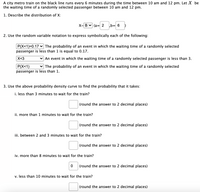
A First Course in Probability (10th Edition)
10th Edition
ISBN: 9780134753119
Author: Sheldon Ross
Publisher: PEARSON
expand_more
expand_more
format_list_bulleted
Concept explainers
Question
I need help answering all of section 3

Transcribed Image Text:A city metro train on the black line runs every 6 minutes during the time between 10 am and 12 pm. Let X be
the waiting time of a randomly selected passenger between 10 am and 12 pm.
1. Describe the distribution of X:
X- B v (a= 2
b= 6
2. Use the random variable notation to express symbolically each of the following:
P(X<1)=0.17 v The probability of an event in which the waiting time of a randomly selected
passenger is less than 1 is equal to 0.17.
X<3
v An event in which the waiting time of a randomly selected passenger is less than 3.
P(X<1)
passenger is less than 1.
v The probability of an event in which the waiting time of a randomly selected
3. Use the above probability density curve to find the probability that it takes:
i. less than 3 minutes to wait for the train?
(round the answer to 2 decimal places)
ii. more than 1 minutes to wait for the train?
(round the answer to 2 decimal places)
iii. between 2 and 3 minutes to wait for the train?
(round the answer to 2 decimal places)
iv. more than 8 minutes to wait for the train?
(round the answer to 2 decimal places)
v. less than 10 minutes to wait for the train?
(round the answer to 2 decimal places)
Expert Solution
This question has been solved!
Explore an expertly crafted, step-by-step solution for a thorough understanding of key concepts.
This is a popular solution
Trending nowThis is a popular solution!
Step by stepSolved in 2 steps

Knowledge Booster
Learn more about
Need a deep-dive on the concept behind this application? Look no further. Learn more about this topic, probability and related others by exploring similar questions and additional content below.Similar questions
- For part a) can you do "Invertibility of B" & "Invertibility of C" and for part b) can you do "For B" & "For C"arrow_forwardI did the same thing. But, the question asks for all that apply which I couldn't figure out.arrow_forwardIt is week 1 and there are currently 84 Apple Watches Series 6 in stock. We need 431 Apple Watches at the start of week 6. Apple Watch has a lead time of 2 week, in which week should an order be placed to meet the requirement of Apple Watches? Input should be an exact number le 5 or 10)arrow_forward
- 4. Part 1: How many phone numbers can be made if all the digits (that is, 10 digits) need to be filled in and any single digit number (0-9) can be used for any digit? Part 2: How many phone numbers can be made if the first digit must be 1, the second digit must be a number in the range 3-5, the third digit must be a number in the range (6-9), and the last seven digits can be any single digit number 0-9?arrow_forwardsmilify all your solutionsarrow_forward
arrow_back_ios
arrow_forward_ios
Recommended textbooks for you
 A First Course in Probability (10th Edition)ProbabilityISBN:9780134753119Author:Sheldon RossPublisher:PEARSON
A First Course in Probability (10th Edition)ProbabilityISBN:9780134753119Author:Sheldon RossPublisher:PEARSON

A First Course in Probability (10th Edition)
Probability
ISBN:9780134753119
Author:Sheldon Ross
Publisher:PEARSON
